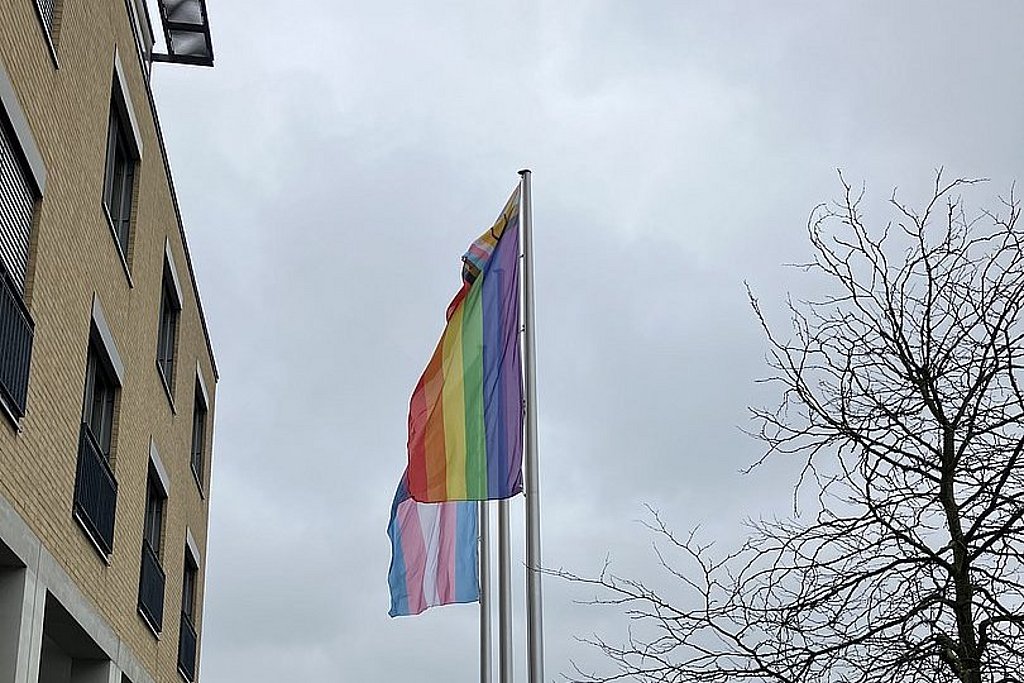Every year on November 20, the Transgender Day of Remembrance, people around the world commemorate those who have fallen victim to trans*phobic violence. Alice Salomon University of Applied Sciences Berlin also sent out a clear signal today to remember those affected and the victims of trans* hostility.
At the raising of the Trans* and Progress flag in front of the main building of ASH Berlin, Peps Gutsche from the Intersectional Practice and Transformation (InPuT) department read out the following statement:
"We are gathered here today to commemorate. To pause. To remember the trans*, non-binary and agender people who lost their lives to violence, hatred and discrimination. On 20 November, trans* communities around the world honour the Trans Day of Remembrance – a day that was established in 1999, one year after the murders of African-American trans women Rita Hester and Chanelle Picket. Twenty-six years later, we stand here and must acknowledge that the violence has not stopped. It has increased.
The Trans Murder Monitoring Project has documented more than 5,000 murders over the past 17 years – over 5,000 lives wiped out by transphobic violence. Almost 95% of those murdered were trans women or transfeminine people – femicides that combine misogyny and transphobia.Over 90% were Black trans people or trans people of colour. Trans people are murdered because they are trans. This violence is the result of concerted efforts by anti-gender and anti-human rights movements that instrumentalise and denigrate trans* people. Their aim is to push through their anti-democratic political agenda.
The European RESIST project has analysed the mechanisms of this anti-gender mobilisation in a comprehensive study across nine countries. Its central goal is to establish LGBTQIA+ people, feminists and others as a problem and to create controversy around our lives and rights.Transphobia is strategically used by anti-gender actors and the far right to spread themselves into the centre of society. The effects are massive: those affected experience social, economic and psychological consequences. People with multiple experiences of marginalisation are particularly affected, as the attacks are intersectional: racialised people, working-class people and people with multiple marginalised identities.
And – particularly alarmingly – states and institutions often act not as protectors, but as agents of anti-gender attacks. On that note, a shout-out to the over 200,000 participants at this year's Budapest Pride, who stood up to a ban!
We need immediate action and therefore demand:
- Effective protection against discrimination and a reform of the General Equal Treatment Act.
- Barrier-free access to trans-specific healthcare.
- Education and awareness about gender diversity.
- Humanitarian visas for trans people who are persecuted and discriminated against in their respective countries. Bring them here!
In case it is not yet clear: trans* rights are human rights. And human rights are not negotiable.
We must not allow a social divide to exist. We must prevent the extreme right's strategy of using racism and trans*phobia as a gateway to the erosion of all human rights from succeeding.
To the trans*, non-binary and agender people here. You are not alone.We see you. In your beauty and your struggle. Your lives are valuable. Your existence is not negotiable. We stand by your side. And we will not stop fighting until all trans* people can live safely and with dignity.
Today we remember the dead.
Tomorrow we fight for the living. Thank you very much."



